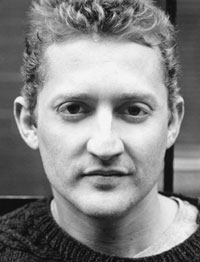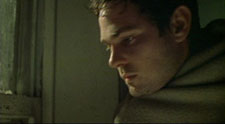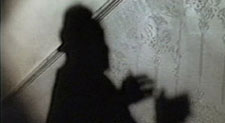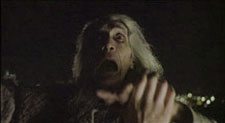 
|
|
|
|

|
 |
 |
FEVER DREAM
by Arnold Salas
 |
Perhaps best known as an actor in a slew of '80s teen flicks, director
Alex Winter has been behind the camera for just as long. After cutting
his teeth as director on a number of music videos, and hosting MTV's
"The Idiot Box," Winter watched his first feature, 1993's brilliant
Freaked cruelly relegated to direct-to-video fate. Eight years later
he's back with Fever a stylish and minimalist neo-noir that's making
people take notice.
On the eve of Fever's theatrical release, via Cowboy Booking International, Arnold Salas speaks to Winter about movies, music and debilitating illnesses. |
| Director Alex Winter. Photo by Robert Zash. |
Filmmaker: Fever is your second feature, your first was Freaked, which didn't get seen by as many people as it could have. Do you want to tell me a little about what happened and what you came away with from the experience?
Alex Winter: Well, what happened with Freaked was one of those typical studio fandangos. We made it for Joe Roth over at 20th Century Fox, and he had a long run at that studio... making a lot of mainstream movies, but also a lot of off-beat films as well, like Barton Fink and Naked Lunch. Towards the end of our shoot, in the middle of our post period, he left the studio and was replaced by a very conservative chairman. It happens in this town, people are at a studio one week and they're not there the next, it's a constant rollover. And it's hard for certain movies, because if you're not making something that's really safe, then you're going to need someone who's going to protect you all the way through to release. Roth was very protective of us all the way through the shoot at first, but afterwards there was nothing he could do for us. The new organization that came in, the film was just way too weird for them. It was an eleven-million dollar cult movie, so it was pretty risky to start off with. But it would have really required someone to hold its hand all the way through... we just didn't have that, so it sort of got dropped off the face of the earth.
We got it out though, and it's got a lot of fans, HBO still runs it, I think a lot of people really got behind it. But it was impossible for us to get the release it would have needed to go anywhere. I also think that for the time it was more off the wall, sort of pushed things further then most even weird comedies were going then, whereas now I think it would fit in a lot easier with the marketplace.
Filmmaker: You had originally envisioned this big release?
Winter: Oh yeah, it was going to be huge. We had this amazing soundtrack with everyone from Iggy Pop to Motorhead doing songs for us. But the fact that we got out on video and did really well was a good thing. If Roth had left two or three months earlier, the whole project would have been shelved, period, and that would have been a disaster. I mean, we would have been happier if Freaked had gotten a mainstream release, but in the end, a lot of people have seen it.
Filmmaker: Did what happened with Freaked affect the way you approached getting Fever done?
 |
| Henry Thomas in Fever. Photo by Michael Ginsburg. |
Filmmaker: Thematically, Fever treads even darker ground than your first feature, which itself was a black comedy. We have this young artist, Nick (Henry Thomas), alienated from family and friends and losing his grip on reality. We suspect he may be a murderer, but there's also this feeling that it's all some kind of hallucination. What attracted you to the story, to Nick's world?
Winter: I wanted to tell a modern noir story, a story steeped in atmosphere and information rather than direct suggestion. That requires a key motive to the story, and I wanted to tell the story of a young, modern-day person who's having a massive psychic and existential crisis. I thought it would be interesting to put some of the more conventional elements of old-school noir into a very modern-day scenario. And that was really the goal, just to tell a very atmospheric, very black noir about sort of modern-day kids, because a lot of movies about young people don't go down that road.
Filmmaker: What was it like being in this character's head while writing and shooting the film? It seems like a pretty intense place to be.
Winter: Well, it was a pretty dark place to be for a while. [Laughs.] But that's what I tried to do while writing Fever — not to sound pretentious — to stay in the main character's headspace and only really know as much as he knew, just showing enough of the world outside as I thought needed to be there in order to get him through his paces. So we never really know how much the character is imposing on the world that we see.
Filmmaker: It brings to mind David Lynch's Lost Highway, where we see through the eyes of a rather disturbed main character, and we're never really sure of what's real or what's imaginary because the character himself doesn't even know.
Winter: Lost Highway is a really good comparison, I think. I saw that about a year after we finished shooting and I was really blown away by it, it was the closest thing to a modern noir that I've seen, ever. I thought what Lynch did with that film was very brave. He was playing with a medium in a way that I really want to play with it in general. Film is amazing, because a lot of it is about experience and atmosphere, space and sound, really subtle things and the way they get to you.
Fever was a lot about creating a space that people go into, and the good thing about a theater over video is that unless you get up and leave, you're stuck there. I wanted to take people on this ride with this character and make them feel as claustrophobic and confused and depressed and oppressed as our main character is. I wanted to play with the medium in that way and to create more of an experience, rather than just tell a conventional story.
Filmmaker: The whole film was incredible to look at, but what stood out most for me was the building where Nick lives... it's like a grey, washed-out nightmare. I was reminded of the places we briefly glimpse in David Lynch's dream sequences... except this time you're stuck there for most of the movie.
 |
| A scene from Fever. Photo by Michael Ginsburg. |
It was really important to create this place... we built the entire interior, and we were extremely painstaking about that in terms of what effect it would have, and what angles we could get with it — the whole thing was storyboarded before we shot it. So it was really about making sure we created a mood out of the building itself, almost like an old-school haunted house movie in a way. Like The Haunting or The Shining, where the space itself is having a significant effect on the character.
Filmmaker: So that building doesn't really exist? It seemed so real.
Winter: The interior doesn't exist at all. We did a lot of research, obviously, and then we took that and pushed it — I wanted it to be able to facilitate each scene. A lot of the characters who were in the building like Will, the drifter who lives upstairs, and Sidney the landlord, are actually almost like manifestations of the building. It's almost like the place itself is pumping these people out to fuck with our main character. It was really important to me that the building had more prescence than any of the characters in that world.
We had fun finding the most interesting elements of all the different tenements we saw, then constructing them to serve certain scenes. Like the archway in Nick's room, we shot that to create a jail-cell-like element, or the weird cage at the top of the stairs where you see Will. Things like that that we felt added to the feel.
Filmmaker: I couldn't help but be reminded of Polanski's The Tenant at times.
Winter: Well, what Polanski's really successful with in that film (and in Repulsion as well) is creating an enviroment that has a real, significant personality. He is certainly a master of showing what effect your enviroment has on you, the significance and legitamacy of actually of being profoundly affected by your enviroment.
I think people who live in the city, in a place like New York, the city does start to affect your headspace in a significant way. And the worse off you are, the more it affects your headspace.
Filmmaker: I thought it was interesting that when Nick is recovering from his illness, it happens in the sanctuary of his parents home. But he's eventually lured back to that horrible place.
Winter: I thinks it's almost like a classic Noir situation - a fever is going to heighten your senses, weaken your system so you don't have as many defenses. It's sort of like when you have insomnia: it's 4 or 5 in the morning and everything feels hopeless. I wanted to strip the character of those defenses, so that he sank into his subconscious, sort of falls back into the various things that can get at you when you're weakened... the things Will, the drifter thinks are cosmic, actual forces, and not just psychological.
Basically the fever is allowing Nick a glimpse of himself, which he decides not to take. So life makes him take it.
Filmmaker: Fever at times seems ready to venture into horror territory, but never strays across the line. It's remarkably restrained, considering how many people might have gone right over the top with the same material.
 |
| A scene from Fever. Photo by Michael Ginsburg. |
I think you can get much more of an interesting and significant effect by playing things more subtly. That's what I loved about The Haunting, because if you think about it, you see almost nothing. It's really one of the classic horror movies for me because of that. Rosemary's Baby is another example.
Filmmaker: Let's Scare Jessica To Death.
Winter: I loved that movie as well. It was really influential for me in a lot of ways. I remember being a kid and seeing it on TV, and just being really affected by it. It was the first thing I ever saw that scared the hell out me during the day. And it's really hard to be scared during the day, because everything's kind of safe and friendly.
The thing I liked about Jessica and The Haunting, and even Lost Highway, is just the pervasiveness of something that's otherworldly or evil, but seeing it come out of a common, dull, everyday existence. In Fever, I like how we put Nick in a kind of clumsy, dull job, but there's even menace to him there. My film is not as much of a straight horror movie as Let's Scare Jessica To Death, but I did like in that film how they really got into the mundane element of evil. When it does come at you, it's really a lot more deep and affecting.
Filmmaker: The discussion of human anatomy during the art classes seems to promise violence that we never get to see.
Winter: We actually shot the murder of the landlord, but it didn't fit. There was no way that Nick would have accepted seeing it. If you watch an interview with a murderer or serial killer... they're often in denial, they don't see it and they're never going to see it. They'll probably go to the chair and on a certain level not be sure whether they did it or not. That's the case with my film for sure. Whether or not Will really existed or not — I'm not sure how much Nick really knows about what happened, who did what to whom.
Filmmaker: As a Brooklyn resident, I enjoyed your choice of Greenpoint for the setting. Why this neighborhood?
Winter: Because I thought it was a good representation of a neighborhood in a major city where there are a lot of working class people and a lot of middle-class people who are either collegiate or artists and have removed themselves from a more cozy, middle-class life.
The funny thing about Greenpoint, where we shot, is that now no one could afford to live there, it's totally gentrified. If I shot the film now, I'd probably shoot it in Queens. But I was sort of looking to tell a story about a middle-class kid who physically removes himself from a comfortable, middle-class existence and puts himself into a more stressful existence, and what this says about him as a character.
Filmmaker: I mentioned restraint before, and that's one of the things I also liked most about the musical score, which I thought worked really well. Was it always clear what direction you wanted to go in terms of that?
Winter: I originally didn't want any music at all, but I thought that, as punishing as the film can be to the audience, that's just going too far. [Laughs.] It was just too oppressive. So we started playing around with music and it was really hard for me to find the right sound for the film, that didn't take us out of the film or try to telegraph too much what we felt the audience was feeling. I wanted something that complemented the buildings and the city, and spoke almost more for the building than the main character.
We only have about 12 minutes of score, maybe about 20 used in the movie, I'm not sure.
Filmmaker: The sound effects in the film are really the score, in a way.
Winter: Well, there was a lot of sound design in the film and the goal definitely was to create a score out of the actual ambient effects. Because Nick is living in the city and his senses are really heightened... he's not hearing loud banging, but rather weird, quiet details everywhere. Like being in a quiet room, your ears and eyes get really super-sensitive. With Fever we really wanted to create that in the audience's head —that the scenes are really quiet and slow enough that you start to get more perceptive, and you hear weird things going on that you wouldn't if barraged with all kinds of noise. Also, the main character is a paranoid, so you want to get people in that space where they're hearing things that may or may not mean anything.
Filmmaker: Speaking of music, you've done work for MTV as well as several music videos. Yet this film was devoid of that sensibility, that flashiness. Was this a conscious effort?
Winter: It was an totally concious decision, especially since Fever was about a twentysomething year old, to keep it as far away from youth-culture hipness as possible. Not that I totally dislike that kind of movie, because they can be a lot fun, but I didn't want to make a movie that just hit you with a ton of imagery and hip music. I felt that when you're dealing with these issues, it's a copout to fall back on sort of big effects — whether they're audio or visual — to try to sell your idea.
I was playing with dread and menace, the subconcious, and I really wanted to let those things come through on their own without trying to force them down the audience's throat with fancy camera angles and hip-hop.The character's so out of touch with everything, anyway. That's what bothers me about those movies, you've got this main character who's a total outcast or who's completely disconnected from the world, and he's playing the latest Prodigy track! There's no way that guy would listen to that music, it's bullshit.
LINKS
Look for VHS tapes, DVDs and records mentioned above on amazon.com:
back to top
home page | subscribe | merchandise | history | order form | advertise | contact
archives | links | search
© 2005 Filmmaker Magazine

